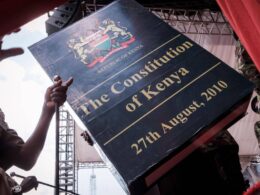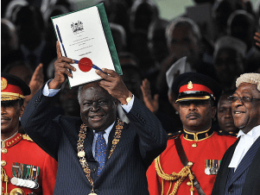NAIROBI,Kenya – Article 49 of Kenya’s Constitution is a cornerstone of the Bill of Rights. It guarantees every arrested person the right to be promptly informed of the reason for their arrest, to remain silent, to legal representation, and to be brought before a court within 24 hours. It also protects the rights to be released on bond or bail, to humane treatment, and to communicate with counsel or family.
These protections were not designed to be aspirational, they are legally binding commitments meant to safeguard Kenyans from arbitrary detention, abuse, and injustice.
Yet, the horrifying death of teacher Albert Ojwang while in police custody reveals how far the country has strayed from those constitutional ideals. Ojwang was arrested in Homa Bay County on June 7 for allegedly violating the Computer Misuse and Cybercrimes Act by posting content deemed defamatory toward Deputy Inspector General Eliud Lagat.
He was then transported nearly 300 kilometers to Nairobi’s Central Police Station. Records show that Ojwang was not entered into the occurrence book until almost 32 hours later, well beyond the constitutional 24-hour limit. During that time, he was reportedly denied access to a lawyer and held incommunicado.
Even more disturbing are the circumstances surrounding his death. Initially reported as a suicide, an independent postmortem commissioned by the family revealed signs of physical assault, head injuries, bruises, and neck trauma, contradicting the police narrative.
Investigators from the Independent Policing Oversight Authority (IPOA) have since uncovered that CCTV footage from the station was tampered with and that station records were manipulated.
Ojwang’s case exemplifies a dangerous pattern, the systematic abuse of Article 49 by police officers who treat constitutional rights as optional. This is not an isolated incident, but part of a broader trend in which the police misuse laws like the Computer Misuse and Cybercrimes Act to silence dissent.
Originally enacted to combat genuine cybercrime threats such as hacking and fraud, the law is increasingly being used to target bloggers, journalists, and activists who criticize the state or its officials. Vague provisions around “false information” and “defamation” have effectively criminalized online speech, creating a chilling effect across the country.
The abuse of this law is especially worrying because it often precedes violations of Article 49. Those accused are picked up without warrants, denied legal representation, held without being charged, and subjected to intimidation or physical harm. Bond and bail processes are delayed or denied, often arbitrarily. These tactics not only violate the Constitution, but also undermine the public’s trust in the justice system.
Albert Ojwang’s death should serve as a wake-up call. It is a grim reminder that a Constitution without enforcement is little more than ink on paper. Kenya cannot continue to tout itself as a democracy while its law enforcement officers routinely violate rights with impunity. The abuse of Article 49 and of laws like the Computer Misuse and Cybercrimes Act threatens the very fabric of rule of law in this country.
Reform is urgently needed to address the ongoing violations of fundamental rights during arrests and detention. First, the government must take concrete measures to fully implement Article 49 of the Constitution, guaranteeing that all arrested persons have timely access to legal representation, the ability to communicate with their families, and are presented before a court without delay.
Second, the Computer Misuse and Cybercrimes Act should be reviewed and amended to remove vague and overly broad provisions that infringe on the right to freedom of expression. Lastly, the mandate and capacity of the Independent Policing Oversight Authority (IPOA) should be strengthened to enable thorough, independent, and timely investigations into incidents of police misconduct and abuse.
The Constitution gave us the tools to protect our rights, but it is up to us to demand their implementation. If Albert Ojwang’s tragic death is to mean anything, it must mark a turning point in how we address police abuse and state overreach. We owe it to him, and to every Kenyan who has been silenced, mistreated, or unlawfully detained, to make Article 49 real, not just in principle, but in practice.
Shukri Wachu is a Journalist and Communications Officer at the Kenyan Section of the International Commission of Jurists (ICJ -Kenya). This article was first published on the Daily Nation.










